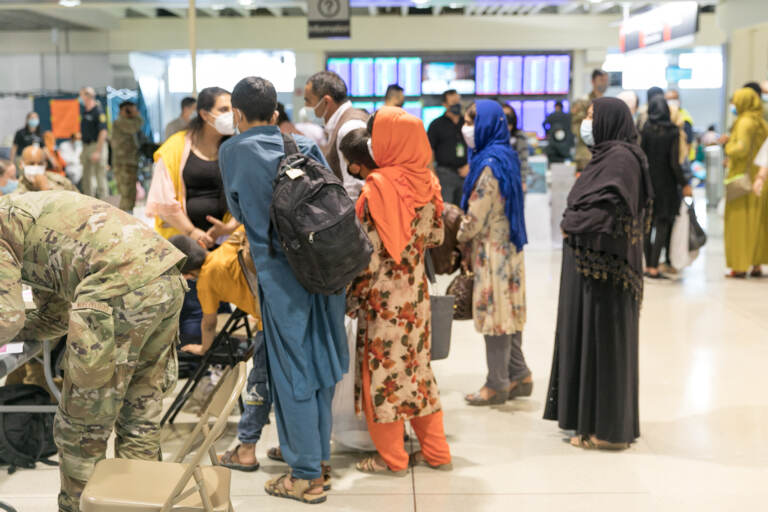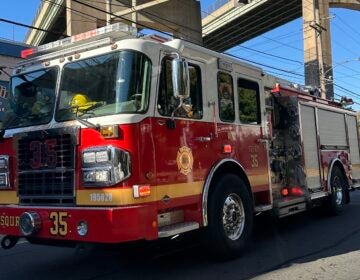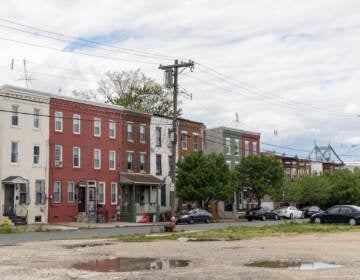‘No one wants to say no’: Philly landlords work to resettle Afghan evacuees
In a region where affordable housing is scarce, resettlement agencies are asking landlords to offer up empty apartments.

Evacuees stand inside Philadelphia International Airport after arriving to the U.S. (City of Philadelphia)
As the U.S. military processes the thousands of people evacuated from Afghanistan over the last few days, Philadelphia’s largest refugee resettlement agencies, along with its largest landlord association, are busy assembling a network of temporary and permanent housing placements for those who want to make the city their new home.
To date, more than 2,300 evacuees have arrived at Philadelphia International Airport, one of the few airports in the nation that has welcomed Afghans who fled the country in the wake of the Taliban takeover. But local officials don’t expect all of them to stick around, even on a short-term basis, in part because they may have family or friends elsewhere in the country who are able to put them up.
Lucy Rabbaa, director of social services for HIAS Pennsylvania, said her organization expects to start the process of permanently resettling roughly 100 people in the coming weeks, with the Nationalities Service Center coordinating help for an additional 100 people. Everyone who has come to Philadelphia so far is being processed at Joint Base McGuire-Dix-Lakehurst in New Jersey.
Rabbaa, who has worked for resettlement agencies for the last 15 years, said this is one of the biggest crises she’s ever responded to. And yet, she doesn’t think finding places for 200 people will be an insurmountable task, in part because she thinks there’s a greater sense of a “moral obligation” to help this group of people because the crisis is rooted in the end of a war initiated by the U.S.
“No one wants to say ‘no’ here,” said Rabbaa.
Through a combination of public and private dollars, the resettlement program hopes to provide evacuees with a place to stay — ideally completely free of charge — for up to three months, possibly more, with the ultimate goal of finding them permanent housing. (The city is not involved with the resettlement aspect of the crisis.)
Beyond that, specific details are scant right now.
Some evacuees may start their stay in Philadelphia in a hotel room or faith institution part of HIAS’s local network. Others may end up staying at an Airbnb rental, part of HIAS’s national network, or living with residents who have volunteered to house people who fled Afghanistan. The goal, however, is to get everyone into an apartment as soon as possible, ideally in a community where other people from Afghanistan are already living. That list includes places like Mayfair and Oxford Circle in Northeast Philadelphia, as well as Bensalem and Bristol Townships in nearby Bucks County.
To that end, HIAS and the Nationalities Service Center are partnering with HAPCO Philadelphia, whose members own or manage more than 20,000 rental units, to pair people with low-to-moderate income apartments — apartments they could realistically afford once they are no longer receiving rental assistance through those groups.
It won’t be easy. Philadelphia has never had an abundance of affordable rental units. HAPCO Philadelphia President Greg Wertman said there are now even fewer options because some small landlords, the backbone of that portfolio, sold their units, in part because of the city’s eviction moratorium, which left some landlords without monthly rent checks for close to two years.
Further complicating things, said Wertman, is that HAPCO doesn’t know which of its members have empty units that could potentially be filled by evacuees, leaving his group to rely on email blasts, social media posts, and other forms of communication to get the word out about the effort.
“This is all voluntary,” said Wertman.
Finding 200 apartments in a specific section of the region presents yet another challenge, said Eduardo Esquivel, NSC’s housing specialist. The sheer total is problematic, but the competition for affordable units in places like Mayfair and Bensalem has also ratcheted up recently as rents overall have increased due to an uptick in demand.
“There’s nothing that stays on the market for more than a couple days, maybe a week at a time,” said Esquivel. “If you want it, you gotta move quick.”
The housing specialist expects some people will end up in North and Northwest Philadelphia, where there may be more available inventory than in the Northeast yet they are still close by.
“We would sooner get someone into a place that’s not quite the perfect neighborhood than we would have them shuffle from one hotel placement to another,” said Esquivel. “The quicker we can get someone into their own place, the quicker they can actually start to heal and start to settle and start to process through all the trauma they’ve been through.”

Subscribe to PlanPhilly
WHYY is your source for fact-based, in-depth journalism and information. As a nonprofit organization, we rely on financial support from readers like you. Please give today.









